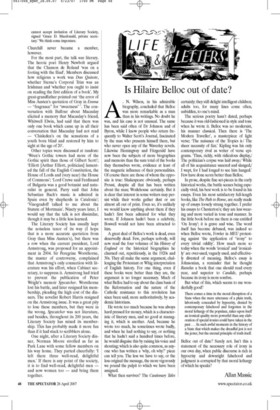Is Hilaire Belloc out of date?
A. N. Wilson, in his admirable biography, concluded that Belloc was more remarkable as a man than in his writings. No doubt he was, and his case is not unusual. The same has been said often of Dr Johnson and of Byron, while I know people who return frequently to Walter Scott’s Journal, fascinated by the man who presents himself there, but who never open any of the Waverley novels. Likewise Hemingway and Fitzgerald have now been the subjects of more biographies and memoirs than the sum total of the books they themselves wrote, evidence at least of the magnetic influence of their personalities. Of course there are those of whom the opposite is true: Shakespeare obviously, perhaps Proust, despite all that has been written about the man; Wodehouse certainly. But it is clear that interest in some writers may persist while their works gather dust or are almost all out of print. Even so, it’s unlikely we would know anything about them if they hadn’t first been admired for what they wrote. If Johnson hadn’t been a celebrity, Boswell would not have been attracted to him.
A great deal of Belloc’s work is dead, even deservedly dead. Few, perhaps nobody, will now read the four volumes of his History of England or the historical biographies he churned out, repetitiously, in the 1920s and 30s. They all make the same argument, challenging the Protestant or Whig interpretation of English history. For one thing, even if these books were better than they are, the argument is no longer necessary. Much of what Belloc had to say about the class basis of the Reformation and the nature of the Catholic resistance to this revolution has since been said, more authoritatively, by academic historians.
He wrote too much because he was always hard pressed for money, which is a characteristic of literary men, and no good at managing it, which is another. And, because he wrote too much, he sometimes wrote badly, and when he had nothing to say, or nothing that he hadn’t said a hundred times before, he would disguise this by raising his voice and shouting; which is also quite common, as anyone who has written a ‘why, oh why?’ piece can tell you. The less we have to say, or the less original the message, the more vigorously we pound the pulpit to which we have been assigned.
What then survives? The Cautionary Tales certainly; they still delight intelligent children; adults too, for many lines come often, unbidden, to one’s mind.
The serious poetry hasn’t dated, perhaps because it was old-fashioned in style and tone when he wrote it. Belloc was no modernist, his manner classical. Then there is ‘The Modern Traveller’, a masterpiece of light verse; ‘The nuisance of the Tropics is / The sheer necessity of fizz.’ Kipling was his only contemporary rival as writer of verse epigrams. ‘Thus, richly, with ridiculous display,/ The politician’s corpse was laid away./ While all of his acquaintance sneered and slanged,/ I wept, for I had longed to see him hanged.’ Few have done scorn better than Belloc.
In prose, despite fine set-pieces in the early historical works, the battle scenes being especially vivid, his best work is to be found in his essays. Even his most satisfactory full-length books, like The Path to Rome, are really made up of essays loosely strung together. I prefer his essays to Chesterton’s; they are less wearing and more varied in tone and manner. In the little book before me there is one entitled ‘On Irony’; it is grave and wise. The word itself has become debased, was indeed so when Belloc wrote, Fowler in MEU protesting against ‘the application of “irony” to every trivial oddity’. How much more so today when the words ‘ironical’ and ‘ironically’ are over-used, vaguely used, and effectively divested of meaning. Belloc’s essay is Johnsonian, a reminder that he thought Rasselas a book that one should read every year, and superior to Candide, perhaps because its irony is more sombre.
But what of this, which seems to me wonderfully good?
There comes a time in the moral disruption of a State when the mere utterance of a plain truth, laboriously concealed by hypocrisy, denied by contemporary falsehood and forgotten in the moral lethargy of the populace, takes upon itself an ironical quality more powerful than any elaboration of special ironies could have taken in the past . . . In such awful moments in the history of a State that which makes the dreadful jest is not the jester, but the eternal principle of truth itself.
Belloc out of date? Surely not. Isn’t this a statement of the necessary role of irony in our own day, when public discourse is rich in hypocrisy and downright falsehood and judgment is corrupted by that moral lethargy of which he speaks?
Allan Massie
























































 Previous page
Previous page